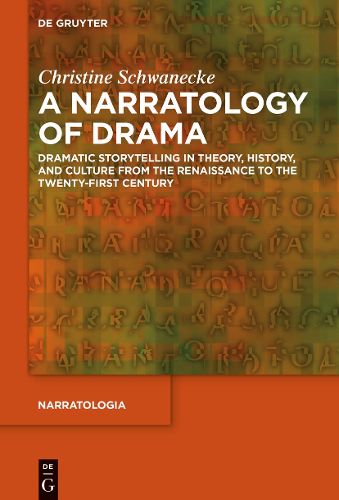Readings Newsletter
Become a Readings Member to make your shopping experience even easier.
Sign in or sign up for free!
You’re not far away from qualifying for FREE standard shipping within Australia
You’ve qualified for FREE standard shipping within Australia
The cart is loading…






This volume argues against Gerard Genette’s theory that there is an insurmountable opposition between drama and narrative and shows that the two forms of storytelling have been productively intertwined throughout literary history. Building on the idea that plays often incorporate elements from other genres, especially narrative ones, the present study theorises drama as a fundamentally narrative genre. Guided by the question of how drama tells stories, the first part of the study delineates the general characteristics of dramatic narration and zooms in on the use of narrative forms in drama. The second part proposes a history of dramatic storytelling from the Renaissance to the twenty-first century that transcends conventional genre boundaries. Close readings of exemplary British plays provide an overview of the dominant narrative modes in each period and point to their impact in the broader cultural and historical context of the plays. Finally, the volume argues that throughout history, highly narrative plays have had a performative power that reached well beyond the stage: dramatic storytelling not only reflects socio-political realities, but also largely shapes them.
$9.00 standard shipping within Australia
FREE standard shipping within Australia for orders over $100.00
Express & International shipping calculated at checkout
This volume argues against Gerard Genette’s theory that there is an insurmountable opposition between drama and narrative and shows that the two forms of storytelling have been productively intertwined throughout literary history. Building on the idea that plays often incorporate elements from other genres, especially narrative ones, the present study theorises drama as a fundamentally narrative genre. Guided by the question of how drama tells stories, the first part of the study delineates the general characteristics of dramatic narration and zooms in on the use of narrative forms in drama. The second part proposes a history of dramatic storytelling from the Renaissance to the twenty-first century that transcends conventional genre boundaries. Close readings of exemplary British plays provide an overview of the dominant narrative modes in each period and point to their impact in the broader cultural and historical context of the plays. Finally, the volume argues that throughout history, highly narrative plays have had a performative power that reached well beyond the stage: dramatic storytelling not only reflects socio-political realities, but also largely shapes them.